The Entrepreneur
Jonathan Jackson: Shaping East Africa’s Future in Real Estate
Jackson and Lordship Africa have faced significant challenges, particularly during the COVID-19 pandemic, which disrupted construction timelines and impacted demand for office spaces. Despite these hurdles, Jackson’s pivot towards digital solutions and investment in resilient sectors like residential real estate has allowed the company to adapt. “We’ve learned to be agile and responsive to market changes,” he says.
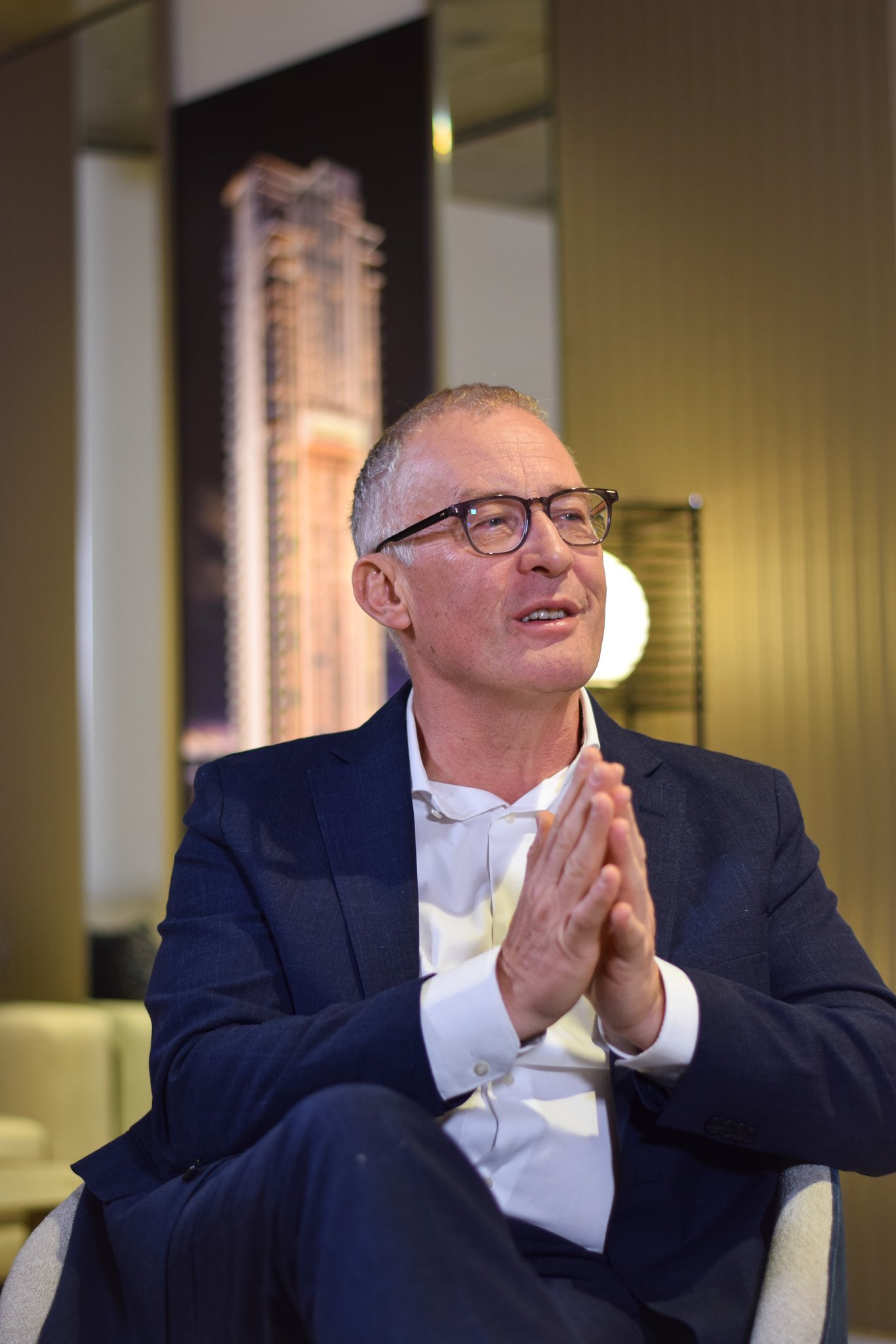
: Discover how Jonathan Jackson, founder of Lordship Group, has built a real estate empire in Kenya and beyond while driving social change through the Jonathan Jackson Foundation. His story exemplifies the powerful synergy between business success and philanthropy, leaving a lasting impact on Nairobi’s skyline and its most vulnerable communities.
By Charles Wachira
Founding Lordship Group
In 1989, at the age of 23, Jonathan Jackson founded Lordship Group in Europe during the transformative Velvet Revolution era in Central and Eastern Europe. His vision was clear: to create high-end real estate projects emphasizing sustainability, luxury, and community impact.
Over the years, the group has developed more than 600,000 square meters (approximately 6 million square feet) of mixed-use space, valued at over $1 billion, including luxury residential, office, and retail properties.
“We aimed to set new standards in real estate by integrating luxury with sustainability,” Jackson explains.
His journey from a young entrepreneur in Europe to a leading real estate mogul and philanthropist in Kenya is a remarkable story of vision, resilience, and dedication.
Early Life and Education
Born in 1951 in Eldoret, Kenya, Jackson was deeply influenced by his father, a deputy bishop in the Africa Inland Church (AIC) and headmaster of a teacher’s college. His father’s commitment to service and education instilled in Jackson a strong sense of community and social responsibility. Jackson’s early education at St. Andrew’s Turi in Kenya laid the foundation for his future endeavors.
Jackson furthered his education in Europe, studying Business Management at London South Bank University.
His time in Europe exposed him to international business practices and helped shape his entrepreneurial spirit.
Reflecting on his upbringing, Jackson notes, “My father’s dedication to service and education taught me the importance of giving back to the community. This principle has guided both my business and philanthropic work.”
Expansion into Africa
The success of Lordship Group in Europe set the stage for Jackson’s expansion into Africa. In 2009, he relocated to Kenya to establish Lordship Africa, a subsidiary of Lordship Group,a real estate development company based in Kenya. It specializes in creating high-end residential, commercial, and mixed-use properties.
The company focuses on delivering innovative and sustainable real estate solutions, with projects that often feature modern architecture and luxury amenities.
Motivated by Kenya’s growing economy, increasing demand for high-quality housing, and a need for commercial real estate meeting international standards, Jackson saw an opportunity.
“I believed Nairobi had the potential to become a global metropolis,” he says. Lordship Africa specializes in high-end residential, commercial, and mixed-use properties.
Flagship Projects and Impact on Nairobi’s Skyline
Jackson’s decision to return home marked a turning point in Kenya’s real estate landscape. By 2023, his projects, which blend sustainability with modern design, have redefined Nairobi’s skyline.
They include The Lordship Park, located in Westlands, Nairobi.This is a luxury apartment complex, designed to cater to the city’s elite while setting a new standard for upscale urban living.It stands as a testament to his dedication to excellence, attracting both local and international buyers seeking premium living spaces.
Additionally, 350 Nairobi, a premium office tower that epitomizes modern business spaces in the heart of Nairobi’s central business district. Boasting state-of-the-art facilities, the tower has attracted both local and international businesses, positioning Nairobi as a regional hub for commerce.
Lordship Africa’s developments focus on green building practices, emphasizing the use of renewable energy sources and eco-friendly materials, which has set a new standard in the region.
In addition there is 88 Nairobi,a marvel of a structure standing approximately 300 meters (984 feet) tall,with 60 floors, making it the tallest residential building in Africa, offering unparalleled luxury amenities and stunning panoramic views of Nairobi has redefined urban living in the heart of Kenya’s capital city.
And there is Karen Hills,a residential master-planned gated community that offers residents world-class infrastructure, a secure and peaceful environment and a host of on-site amenities and services devised to maximize the quality of community life
Reflecting on his entrepreneurial success, Jackson emphasizes the importance of effective management and surrounding oneself with the right team.
“Management is key in the development of any project,” he says. He attributes much of his business growth to maintaining transparency, professionalism, and a calculated approach to risk-taking. These principles, he believes, have helped him navigate the complex real estate landscape, both in Europe and in Kenya.
Football Club Investment
In addition to his real estate ventures, Jackson has invested in Nairobi City Stars Football Club, a Kenyan Premier League team.
However, his involvement faced challenges due to corruption in Kenyan football. Coaches often selected players based on personal connections, and referees demanded bribes. Jackson’s refusal to comply led to biased officiating against his team, affecting player morale and performance.
“Navigating corruption was tough, but it reinforced my belief in maintaining integrity,” Jackson reflects.
Philanthropy
In 2019, Jackson went ahead to found the Jonathan Jackson Foundation with a mission to uplift Kenya’s most vulnerable communities. Influenced by his family’s commitment to service, the foundation focuses on job creation, sustainable income initiatives, and addressing urban poverty. It has provided meals, employment, and support to informal settlements like Kibera, helping hundreds of families escape poverty.
“Real change happens from the ground up by empowering communities to sustain themselves,” Jackson emphasizes.
The foundation’s key projects include partnering with Nairobi City County Government to provide housing for the homeless.
As chairman of the foundation’s advisory board, Jackson’s goal is to create lasting impact through collaboration with local communities, focusing on building long-term sustainable solutions for issues like unemployment and poverty.
Challenges and Future Vision
Jackson and Lordship Africa have faced significant challenges, particularly during the COVID-19 pandemic, which disrupted construction timelines and impacted demand for office spaces. Despite these hurdles, Jackson’s pivot towards digital solutions and investment in resilient sectors like residential real estate has allowed the company to adapt. “We’ve learned to be agile and responsive to market changes,” he says.
Looking ahead, Jackson envisions further expansion into East African markets, including Kampala and Dar es Salaam. His goal is to replicate the success of Lordship Africa’s projects in Nairobi across the region, promoting sustainable urban growth and creating investment opportunities.
In addition to football, Jackson faced hurdles in real estate development in Nairobi. He criticized decades of poor urban planning that led to disorganized infrastructure, making it challenging to implement sustainable projects. However, Jackson expressed optimism, noting that recent efforts by the government to bring order to the city’s development were promising.
Conclusion
Jonathan Jackson’s story is one of innovation, philanthropy, and vision. From establishing Lordship Group in 1989 to building a real estate empire in Kenya and beyond, his contributions to the region’s economic and social development are unparalleled. With a portfolio worth over $1 billion and a commitment to uplifting Kenyan communities through his Jonathan Jackson Foundation, Jackson has cemented his legacy as one of the most influential business leaders in East Africa.
Through his work in both real estate and philanthropy, Jonathan Jackson is proving that business success and social responsibility can indeed go hand in hand, leaving a lasting impact on Nairobi’s skyline and its most vulnerable communities.
Keywords: Real Estate Development: Sustainability and Luxury: Philanthropy in Kenya: Impact on Nairobi’s Skyline: Expansion into East Africa
She Business
Bethlehem Tilahun Alemu: From Ethiopian Artisan to Global Icon

: Discover how Bethlehem Tilahun Alemu built SoleRebels into a global,
sustainable footwear brand, overcoming challenges and transforming Ethiopian
craftsmanship.
Bethlehem Tilahun Alemu’s story begins in Zenabwork, a modest village on the outskirts
of Addis Ababa, Ethiopia. Growing up, she watched her community struggle with unemployment and poverty, despite a rich heritage of artisanal skills that remained largely untapped.
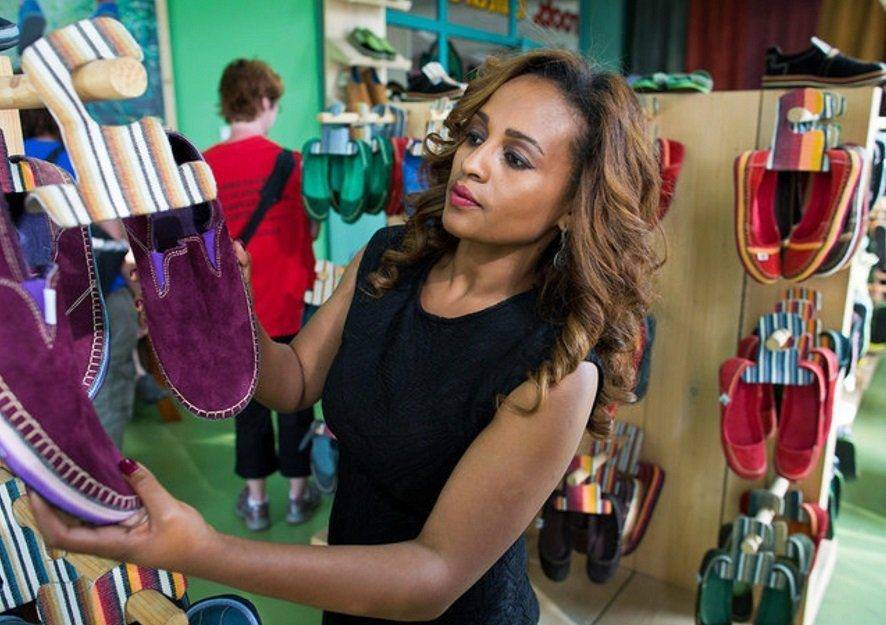
Fueled by determination and a desire to transform her surroundings, Bethlehem
embarked on a journey that would redefine African entrepreneurship and put Ethiopia
on the global map.
Her creation, SoleRebels, isn’t just a footwear brand. It’s a movement—an embodiment
of sustainability, culture, and empowerment.
A DREAM WOVEN WITH TRADITION
In 2005, Bethlehem founded SoleRebels with a simple yet powerful idea: to turn
Ethiopia’s rich artisanal craftsmanship into eco-friendly, globally competitive footwear.
Inspired by traditional “selate” shoes—made from recycled tyres—she envisioned a
brand that blended cultural authenticity with modern design.
She recruited local artisans, many of whom were unemployed, and encouraged them to
innovate while preserving traditional techniques.
Every pair of shoes was a masterpiece, crafted from hand-spun cotton, organic
materials, and repurposed car tyres. Bethlehem’s concept was groundbreaking: a product that told a story while making a global impact.
STARTING FROM SCRATCH
Like many entrepreneurs, Bethlehem’s initial challenge was capital.
With no access to bank loans or large investors, she relied on personal savings and
modest contributions from her family.
Slowly but surely, she built her business, reinvesting profits into training workers and
improving production tools. International grants and initiatives like the SEED Initiative later recognized the potential of her venture, providing additional support.

The early days weren’t easy. Artisans lacked modern tools, and accessing raw
materials was an uphill battle. But Bethlehem, known for her tenacity, tackled these challenges head-on. She developed partnerships with local suppliers to ensure a consistent supply of quality materials and invested in upskilling her workforce.
Breaking into the global market presented another hurdle. Competing against established brands seemed daunting, but Bethlehem found her edge: sustainability and ethical production.
In an era when consumers were becoming eco-conscious, SoleRebels’ ethos of fair wages, recycled materials, and cultural storytelling resonated deeply.
BUILDING A GLOBAL EMPIRE
Fast forward to today, and SoleRebels has a presence in over 30 countries, with
flagship stores in cities like San Francisco, Tokyo, and Barcelona.
It is also the first African footwear brand to be certified by the World Fair Trade
Organization (WFTO)—a testament to Bethlehem’s commitment to doing business the
right way.
Her company directly and indirectly employs over 1,200 people, making it one of
Ethiopia’s largest employers in the artisan sector.
Workers earn more than three times the industry average, a policy Bethlehem takes
immense pride in. “When we pay people well, we don’t just change lives—we transform
communities,” she says.
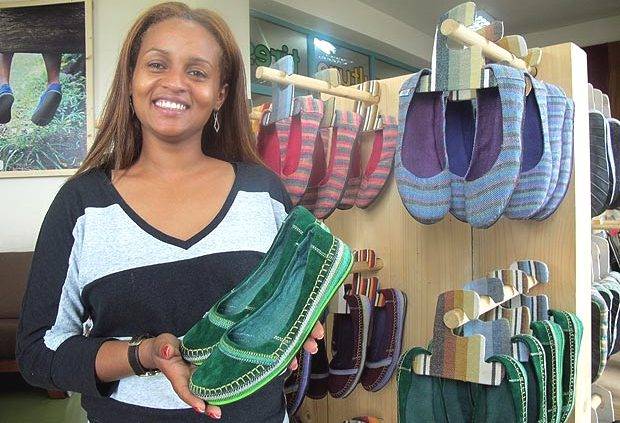
MENTORS AND INSPIRATIONS
Bethlehem often credits her late grandfather, a farmer and community leader, as her
greatest mentor.
His work ethic and deep belief in the power of local communities shaped her vision. She
also draws inspiration from global leaders, including Ethiopian Prime Minister Abiy
Ahmed, whose focus on innovation and economic growth aligns with her goals.
RISING ABOVE CHALLENGES
Bethlehem’s entrepreneurial journey has been marked by resilience. When production
scaled up, she faced supply chain disruptions that threatened deadlines. Her solution?
Cultivate long-term relationships with reliable local suppliers and diversify material
sources.
Entering new markets came with its own set of obstacles. Competing against
established brands requires a unique value proposition.
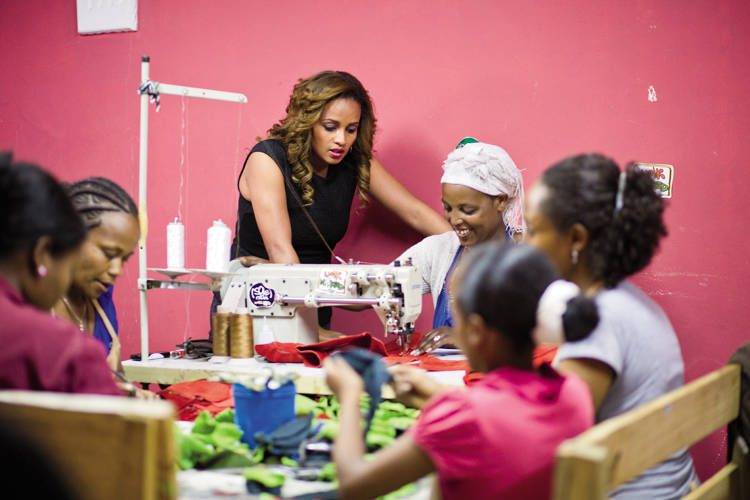
SoleRebels offered more than shoes—it offered a story: a product steeped in Ethiopian
culture, made sustainably, and crafted ethically.
VISION FOR THE FUTURE
Bethlehem isn’t slowing down. Her plans include:
- ● Expanding SoleRebels’ retail presence in Europe and Asia.
- ● Introducing sustainable clothing lines.
- ● Partnering with global brands to promote eco-friendly production in Africa.
Beyond SoleRebels, Bethlehem has a broader mission: to inspire a new narrative for
African entrepreneurship. She wants to show the world that Africa isn’t just a consumer
market but a hub for innovation and excellence.
CONCLUSION: WALKING THE TALK
Bethlehem Tilahun Alemu has redefined what it means to be an entrepreneur. From
Zenabwork’s dirt roads to the global stage, she has shown that success doesn’t come
from resources alone—it comes from vision, grit, and a deep connection to one’s roots.
With SoleRebels, Bethlehem has not only created a thriving business but a model for
how sustainable, ethical enterprises can transform communities. As she continues to
dream big, her footsteps pave the way for the next generation of African changemakers.
She Business
Joyce Akinyi Convicted: Heroin Smuggling Case Exposed

: Kenyan businesswoman Joyce Akinyi faces life imprisonment after being found
guilty of smuggling heroin worth US$ 34,483. Her history with crime has now
unravelled.
Joyce Teresia Akinyi’s story is one of dramatic highs and lows—rising from a successful
businesswoman to being convicted of a large-scale heroin smuggling operation.
With ties to international criminal networks, high-profile relationships, and repeated run-
ins with the law, Akinyi’s life has been marked by controversy and legal battles.
THE HIGH LIFE: BUSINESS AND INFLUENCE
Akinyi first gained prominence as the upscale Deep West Resort owner in Lang’ata,
Nairobi. Known for her affluent lifestyle, she mingled with Kenya’s elite and maintained
significant business interests.
However, behind the glamorous facade lay a darker world of alleged criminal activity.
Her personal life was equally turbulent. In 1998, she met Nigerian businessman Anthony Chinedu, and the couple had two children before formalising their union.
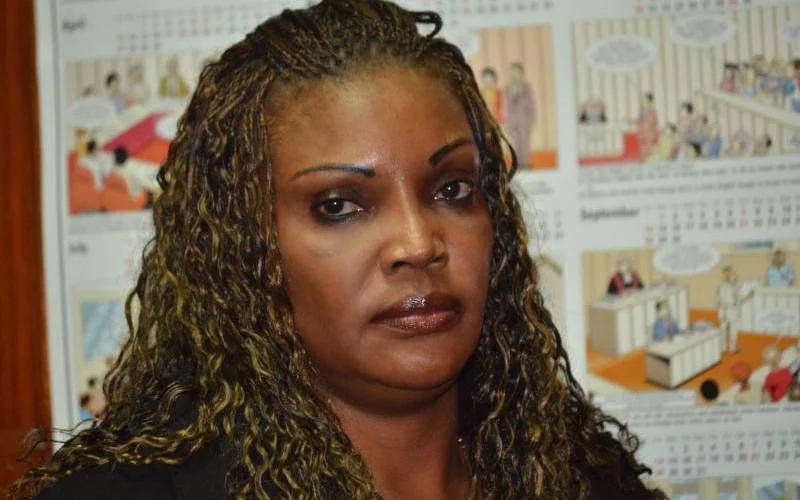
Their relationship was rocky, marked by numerous arrests on drug trafficking charges.
In 2013, Chinedu was deported from Kenya after authorities seized drugs in his
possession, a move that further exposed Akinyi to public scrutiny.
A HISTORY OF LEGAL TROUBLES
Over the years, Akinyi faced repeated allegations of drug trafficking. Her name became
prominent in 2008 when she was arrested in New Delhi, India, alongside former
Budalang’i MP Raphael Wanjala.
Authorities detained the pair with undeclared cash worth Sh7.59 million, suspected to
be linked to drug deals. Although released after intervention by the Kenyan government, the incident marked the start of a string of legal troubles for Akinyi.
In 2013, she and Wanjala were arrested again on the Nairobi-Namanga highway with a
suspicious white powder. Although they claimed it was corn flour, suspicions persisted,
and Akinyi’s criminal associations deepened.
THE TURNING POINT: CONVICTION FOR HERION SMUGGLING
Akinyi’s criminal activities reached a dramatic conclusion in 2019 when a police raid on
Deep West Resort uncovered 2kg of heroin worth Sh5 million hidden in a shoe rack.
The Anti-Narcotics Directorate linked the operation to an international smuggling
network coordinated by Akinyi.
The Jomo Kenyatta International Airport Tribunal found Akinyi guilty under Article
4(a) of the Narcotic Drugs and Psychotropic Substances Control Act, which
mandates life imprisonment for drug trafficking.
The court heard compelling evidence, including photographs of heroin wrapped in white
tape, voice recordings coordinating smuggling activities, and the discovery of a Tabita
Digital Scale used to weigh drugs.
Akinyi’s co-defendants, Paulin Kalala Musankinshay and Peres Adhiambo, were
similarly implicated. Evidence also revealed that Akinyi used multiple fake passports, including a Congolese passport in the names of “Mape Marline Kambura” and “Raha Eveline
Kambere,” enabling her to operate under different aliases.
FINANCIAL CRIMES AND ASSET RECOVERY
Beyond drug trafficking, Akinyi’s wealth came under scrutiny. In 2021, she lost two
luxury vehicles worth Sh20 million to the State, deemed proceeds of crime.
Investigations by the Asset Recovery Agency revealed that Akinyi deposited
suspiciously large sums ranging from Sh60,000 to Sh20 million into various bank
accounts. Her real estate investments—villas built and rented out—further indicated
illicit income sources.
THE END OF THE ROAD
On December 10, 2024, Akinyi faces sentencing, which could include life
imprisonment and a Sh5 million fine. Her fall from grace highlights the dangers of
unchecked ambition and illegal pursuits. Magistrate Njeri Thuku, who presided over the
case, dismissed Akinyi’s defence that the drugs were planted by her estranged husband
Chinedu, calling it baseless.
CONCLUSION
From her meteoric rise as a business mogul to her conviction as a drug trafficker, Joyce
Akinyi’s life is a cautionary tale of how power, wealth, and crime can intertwine.
Her story also underscores Kenya’s ongoing battle with drug trafficking and the far-reaching
consequences of organised crime. For Akinyi, the glitz and glamour of her former life
have now given way to the stark reality of justice.
Nb: Exchange rate 1 USD = 145 Ksh
The Entrepreneur
Miss Rwanda 2022, Divine Muheto, Faces Drink-Driving Scandal

: Miss Rwanda 2022, Divine Muheto, was arrested for drink-driving, fined, and
detained after a car crash. She expresses regret and seeks forgiveness for her
actions.
From Beauty Queen to Legal Controversy
Divine Muheto, 21, crowned Miss Rwanda 2022, rose to prominence as a symbol of
beauty and ambition. She always believed she had what it took to achieve her childhood
dream of becoming a beauty queen.
Her journey began after high school when she entered the Miss Rwanda competition,
ultimately claiming the coveted title.
Reflecting on her success, she once said, “When you fear, you can’t make anything
different in life, but when you are fearless, a lot of positive things come your way.”
Legal Troubles in 2024
However, her reign as Miss Rwanda has been overshadowed by controversy. In late
2024, Muheto was arrested following a drink-driving incident in Kigali.

Reports from the Rwanda National Police (RNP) confirmed that she was caught driving
under the influence of alcohol without a valid license, resulting in a crash that destroyed
public infrastructure, including a street light pole and palm trees.
The police also noted that Muheto fled the scene of the accident. She was subsequently
fined 190,000 Rwandan francs (approximately $140) and detained.
This incident marked a troubling pattern, as the beauty queen had previously faced
similar charges in September 2023, when she crashed her car into a building while
driving drunk.
Silent Remorse and Public Engagement
Muheto, the daughter of Assistant Commissioner of Police Francis Muheto, has
remained largely silent in the media following her arrest, though her legal team has
expressed that she deeply regrets her actions and has sought forgiveness.
Despite this, she continues to be a public figure, engaged in various activities. Her legal troubleshave raised concerns, but she remains resolute in her belief that life’s challenges present growth opportunities.

Inspirational Messages and Support System
While her parents have largely stayed out of the spotlight, Divine Muheto has continued
to inspire many young people in Rwanda, emphasising resilience and self-improvement.
She once said, “I knew I had what it takes to the last dot,” and even in the face of
adversity, she strives to move forward, learning from her mistakes and striving to make
a positive impact.
-

 Politics5 months ago
Politics5 months agoFred Okengo Matiang’i vs. President William Ruto: A 2027 Election Showdown
-

 Business & Money10 months ago
Business & Money10 months agoEquity Group Announces Kshs 15.1 Billion Dividend Amid Strong Performance
-

 Politics4 months ago
Politics4 months agoIchung’wah Faces Mt. Kenya Backlash Over Gachagua Impeachment Support
-

 Politics7 months ago
Politics7 months agoPresident Ruto’s Bold Cabinet Dismissal Sparks Hope for Change
-

 Politics7 months ago
Politics7 months agoPresident Ruto’s Lavish Spending Amid Kenya’s Economic Struggles Sparks Outrage
-

 Politics6 months ago
Politics6 months agoJohn Mbadi Takes Over Kenya’s Treasury: Challenges Ahead
-

 Business & Money3 months ago
Business & Money3 months agoMeet Kariuki Ngari: Standard Chartered Bank’s new CEO of Africa. What’s Next?
-

 Politics7 months ago
Politics7 months agoKenya Grapples with Investor Confidence Crisis Amid Tax Protest Fallout





